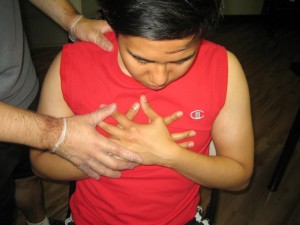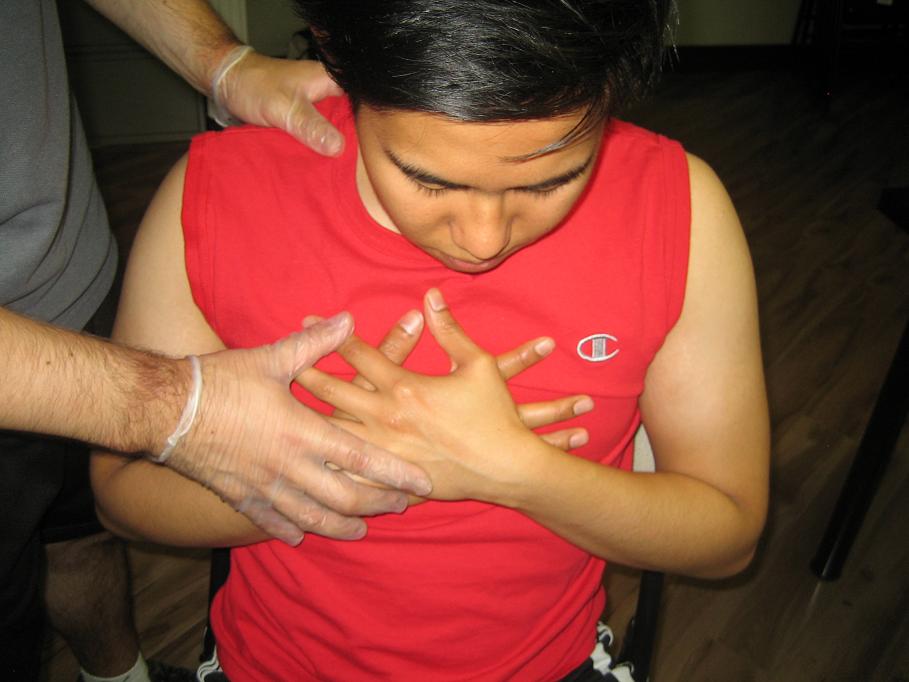Pulmonary contusion is the bleeding or bruising of the lung tissue that usually results from a blunt trauma to the chest, leading to pain and trouble breathing.

Pulmonary contusion is the bleeding or bruising of the lung tissue. This is usually caused by a blunt trauma to the chest, typically leading to pain and trouble breathing. The force from the trauma may result to bleeding and swelling inside one or both of the lungs. It is a fairly common injury. Pulmonary contusion is particularly dangerous as it may lead to oedema and blood collection in the alveolar spaces, causing loss of normal lung structure and function.
Several tests will be done by a doctor is required for proper diagnosis. The doctor will examine the patient and question him/ her about his/ her symptoms. The doctor will likely observe how the patient breathes and check the chest region for any fracture, puncture or bleeding in the skin. Although physical examination may be useful to some extent, there are other tests that may be used to diagnose pulmonary contusion including arterial blood gases, chest x-ray, ultrasound and CT scan.
Causes of Pulmonary Contusion
The following may lead to blunt trauma to the chest, which may lead to pulmonary contusion. Although blunt trauma is the more common cause of pulmonary contusion, penetrating trauma may also cause pulmonary contusion.
- Traumatic motor vehicle accidents (most common cause)
- Skateboard or bicycle accidents
- Physical assaults
Signs and Symptoms of Pulmonary Contusion
The three components of a pulmonary contusion include oedema (swelling from fluid retention), haemorrhage (profuse bleeding), and atelectasis (partial or complete collapse of the lung). However, these symptoms may not be easily detected as they are all internal. One can suspect an individual is suffering from pulmonary contusion if he/ she manifest the following symptoms, especially after chest trauma:
- Severe chest pain and discomfort
- Trouble breathing
- Quick and shallow breathing
- Wheezing, especially upon exhalation
- Coughing up blood or big amounts of watery sputum
Complications of Pulmonary Contusion
The following complications may develop from pulmonary contusion. In some cases, these complications develop despite treatment.
- Acute respiratory distress syndrome (ARDS)
- Respiratory failure
- Pneumonia
- Atelectasis
Treatment for Pulmonary Contusion
Treatment for pulmonary contusion will be tailored according to the severity of the injury. Some of the possible treatments for pulmonary contusion can include:
- Using pain medications to alleviate pain and discomfort over breathing
- Oxygen treatment
- Breathing deeply and coughing
- Suctioning to remove any mucous or blood that may be blocking the air passages
- Using chest tubes to eliminate any air, blood or fluid from the lungs or heart
- Using a non-invasive positive-pressure ventilation machine to assist in breathing or mechanical ventilation
Disclaimer: This article does not provide medical advice or treatment. The information given should not be used for self-diagnosis of possible conditions. Seek medical attention when necessary. Understanding pulmonary contusion may help when taking first aid training. To learn more about to how to recognize symptoms of pulmonary contusion and other conditions, enrol in workplace approved first aid training courses with a credible provider near you.
Sources:
Chest Trauma Pulmonary Contusion. (2004). Trauma.org. Retrieved on October 14, 2013, from http://www.trauma.org/archive/thoracic/CHESTcontusion.html
Pulmonary Contusion. (ND). Colorado State University: College of Veterinary Medicine and & Biomedical Sciences. Retrieved on October 14, 2013, from http://www.cvmbs.colostate.edu/clinsci/wing/trauma/pulmcont.htm
Pulmonary Contusion. (ND). Drugs.com. Retrieved on October 14, 2013, from http://www.drugs.com/cg/pulmonary-contusion.html

